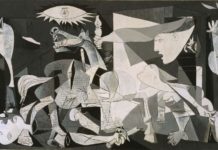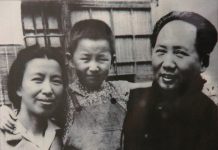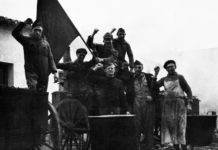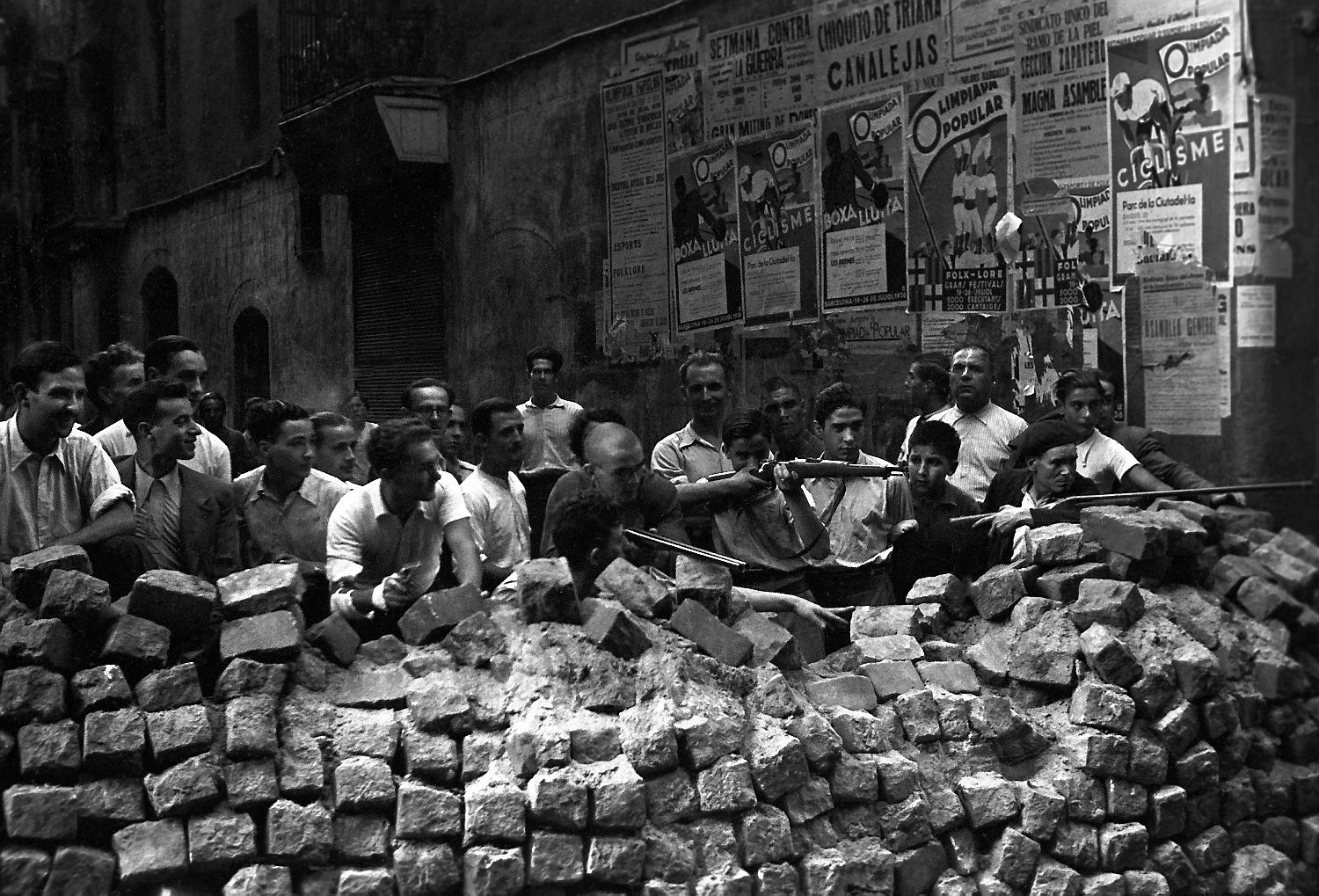
When the fascist-backed general Franco in July 1936 led the military coup against the elected Popular Front government, the Spanish working class answered back by taking over control of factories and land in central areas of the country. This response to the raising of the rich and the right put the question on who were to take control of society. This was the beginning of the Spanish Civil War.
- Articles
- Web sites
- Books (or chapters) and pamphlets online
- Films
- Posters/Photos
- Songs
- On the International Brigades/Volunteers in the civil war
See also at Socialistisk Bibliotek (Socialist Library):
- Subject overview Spanien / Spain
- Link collection: On Capas photograph “Falling Soldier”
- Link collection: Ken Loachs film Land and Freedom
- Link collection: Andrés Nin & POUM
- Link collection: Den spanske borgerkrig og revolution 1936-39 (references in Scandinavian only)
- Timeline: August 19, 1936, on the poet Frederico Lorca.
Foreword
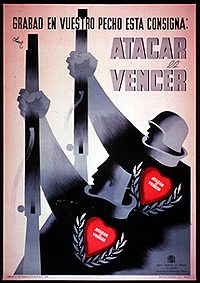
When the fascist-backed general Franco in July 1936 led the military coup against the elected Popular Front government, the Spanish working class answered back by taking over control of factories and land in central areas of the country.
This response to the raising of the rich and the right put the question on who were to take control of society.
Due to the revolutionary possibilities Spain became in 1936-37 a test for all political tendencies in the labour movement.
The extreme left was unable to develop the revolutionary situation and the dual power between the workers and the state power.
The largest and dominating tendencies in the workers movement had the notion, that the nationalist’s rebellion could be fought without the struggle for social revolution.
To fulfil their re-establishing of the state power and army of the Popular Front government, workers power was crushed; – a defeat that from turning point in the May Days 1937 onward made the civil war to a defensive fight against Franco and his international fascist backers.
This webliography is compiled from a revolutionary socialist angle on the Spanish Civil War. The materials are compiled from the Republican side, and should be covering almost all analysis of the labour movement. The main focus is though on the possibilities for the Spanish revolution and on the politics and debates of the revolutionary left.
The lessons of the Spanish revolution and civil war are important – even today.
Not just for the debates and views of the civil war, but the attitudes and experiences, that demonstrates the idea of socialism and dual power in practice – and how to achieve it.
This webliography was originally made as a leaflet due to the film Land & Freedom in December 1995, that is why some of the materials are not online, but all references are hereby available on the web in a heavily revised online-edition.
Suggestions for sites and articles are welcome.
Jørgen Lund & Bjarne A. Frandsen.
15. July 2006.
Revised edition July 2011 and July 2016.
Overview articles
- Spanish Civil War, 1936 (Chronology) (Wikipedia.org).
- The main events of the Spanish Civil War (Chronology).
- Spanish Civil War (Spartacus Educational).
- Spanish Civil War (Wikipedia.org).
Articles
Against the Current
Wilebaldo Solano: The POUM’s seven decades (No. 143, November-December 2009).
“The Partido Obrero de Unificacion Marxista (The Workers Party of Marxist Unification, POUM) was founded in Barcelona on September 30, 1935 … It is universally known that POUM was one of the forces that actively intervened in the fight against the fascist-military insurrection in Catalonia, Valencia, Madrid, Asturias and elsewhere.”
Gerd-Rainer Horn: A classic study revisited (No. 143, November-December 2009). Review of Pierre Broué and Émile Témime, The Revolution and the Civil War in Spain (Chicago, Haymarket, 2008).
Reiner Tosstorff: Chronicles from the front (No. 143, November-December 2009). Review of Gerd-Rainer Horn (editor), Letters from Barcelona: An American Woman in Revolution and Civil War (Basingstoke, Palgrave, 2009).
Counterfire
Perfidious Albion: Britain and the Spanish Civil War (17 March 2024). Review of Paul Preston’s book (Clapton Press, 2024, 242 p.).
“Chris Bambery recommends [the book], but disputes view that the kind of revolutionary war Orwell championed could not have defeated Franco and the fascists.”
CounterPunch
Claud Cockburn: Scenes from the Spanish Civil War (August 1, 2006).
From A Discord of Trumpets (1956), the U.S. edition of the first volume of Claud Cockburn’s memoirs. He covered the war for the Communist Party’s newspaper the Daily Worker. When he arrived in Spain, he joined the Fifth Regiment so that he could report the war as an ordinary soldier.
Vicente Navarro: A forgotten genocide: the case of Spain (December 16, 2008).
“A social movement has been growing in Spain, breaking the 30-year pact of silence on the enormous atrocities and genocide carried out during and after the fascist coup led by General Franco.”
Vicente Navarro: The Spanish Civil War, 70 years on: the deafening silence on Franco’s genocide (pdf) (July 19, 2006).
“The right wing has continued to pay homage to General Franco and his fascist forces. In many Spanish towns (except, again, in Catalonia and the Basque countries) there are still fascist monuments. Even left-wing municipal and regional governments are afraid to destroy them. And across Spain, there are frequent celebrations honoring the assassins. Recently, the PP opposed a declaration by the European Parliament condemning the Spanish dictatorship, as did some ultra-rightists in Poland’s government.”
See critique in What Next? below.
Critique
Stephen Schwartz: The Spanish Civil War in historical context (pdf) (Issue 32-33, 2001, p.147-165; online at Internet Archive WayBackMachine).
“… in the aftermath of the conflict a deliberately falsified version of its history, concocted by Stalinist methods and under Soviet inspiration, was imposed as a template on the consciousness af American liberals and radicals.”
Encyclodedia of Trotskyism On-Line
Tema: Document Library: Spanish Revolution / Spanish Trotskyism
Articles from Revolutionary History.
Fourth International
Pierre Broué: Trotsky and the Spanish Revolution (Vol. 4, No. 1, April 1967, p.4-17; online at Marxists Internet Archive).
“This essay was not intended to retrace, even in outline, the stages of the Spanish revolution which covered the peninsula with blood from 1936 to 1939 … We deal here simply with a sketch of Trotsky’s positions in this Spanish drama …”
In Defence of Marxism
Arturo Rodriguez: Anarchism in the Spanish Revolution and Civil War: action without theory is blind (
Arturo Rodríguez: The Spanish Civil War and the crimes of Stalinism (
Jorge Martin: Time to exorcise the ghost of Franco (18 July 2016).
“Eighty years after the beginning of the Spanish Civil War and 40 years after the end of the Franco dictatorship which followed it, this is an issue which in Spain raises white hot passions.”
Rob Sewell: 80 Years since the Spanish Civil War (18 July 2016).
“Today marks the 80th anniversary of the beginning of the Spanish Civil War.” With links to articles by Ted Grant, Leon Trotsky, Pierre Broue and Jorge Martán.”
Alan Woods: Introduction to ‘Revolution and Counterrevolution in Spain’ (5 December 2014).
“The introduction [to Felix Morrow’s classic Revolution and counterrevolution in Spain] provides a brief analysis of the reasons for the defeat of the Spanish Revolution of 1931-37 while also dealing with the resurgence of the Spanish workers’ movement in the 1960s and 70s and drawing the lessons for today.”
International Socialism
Chris Ealham: Revolution and reaction in Spain (Issue 117, Winter 2008, p.181-184).
Review of Andy Durgan, The Spanish Civil War (Palgrave, 2007).
“For all the thousands of books published on the Spanish Civil War, few studies of the conflict’s origins, course and consequences are as valuable and welcome as this current study.”
See also Ann Talbot: Britain’s Socialist Workers Party lends credence to Stalinist line on Spanish Civil War, 1-2 (World Socialist Web Site, 16-17 September 2008).
Seventy years after the Spanish Civil War (Issue 111, Sommer 2006, p.163-170). Interview with Andy Durgan.
“Revisionist accounts of the war, usually written by ‘journalists’, which resurrect all the old distortions of Francoist historiography, of unbridled red terror, savage abuse of the clergy and even the hoary old nonsense of a Moscow plot, can be found filling shelves of reputable book shops.” Incl. talk about some book.
Andy Durgan: Freedom fighters or Comintern army?: the International Brigades in Spain (Issue 84, Autumn 1999, p.109-131).
“The International Brigades are one of the most famous examples of internationalism in working class history. Andy Durgan, historical adviser on Ken Loach’s Land and Freedom, assesses their impact in the Spanish Civil War.”
John Newsinger: Orwell and the Spanish Revolution (Issue 62, Spring 1994, p.71-90).
“[Orwell] is the author of one of the most important celebrations of revolution in English literature, Homage to Catalonia. In this account of his experiences with the POUM (United Marxist Workers Party) militia in Spain, he makes clear his commitment to both working class struggle and to socialism, and at the same time his steadfast opposition to Stalinism and its apologists.”
Andy Durgan: Bookwatch: Civil war and revolution in Spain (Issue 69, Winter 1995, p.109-121).
“Andy Durgan was an historical adviser on Ken Loach’s acclaimed film about the Spanish Revolution, Land and Freedom. In this quarter’s Bookwatch he supplies a comprehensive readers’ guide to one of the turning points of the 20th century.”
Andy Durgan: The rise and fall of Largo Caballero (Issue 18, Winter 1983, p.87-107).
“… the experience of Largo Caballero and the left Socialist demonstrates that there is no middle road between revolution and reformism … those who try to straddle the two are broken at times of revolutionary crisis.”
Andy Durgan: Revolutionary anarchism in Spain: the CNT 1911-1937 (Issue 11, Winter 1981, p.93-110).
“Why did the CNT crumble so abjectly when faced with their greatest revolutionary opportunity? The answer must be found in the inadequacies of anarchist theory … Only this can begin to explain how the anarcho-syndicalists vacillated between petty bourgeois opportunism and wild ulta-left adventurism.”
See also Andy Durgan at Marxists Internet Archive. With most af the 18 articles about the Spanish Civil War.
International Socialist Review
Geoff Bailey: Anarchists in the Spanish Civil War (Issue 24, July-August 2002).
“The Spanish Civil War was the high point of anarchist influence in the international workers’ movement. On the eve of the civil war, the anarchosyndicalist Confederación Nacional del Trabajo (CNT) claimed more than a million members and had as its stated aim the revolutionary overthrow of capitalism. Yet the Spanish anarchist movement failed the test that supposedly formed the heart of its program: the destruction of the state.”
Irish Marxist Review
Barcelona 1936: a workers revolution (Vol.8, No.23, 2019, p.53-59).
“In this article Andy Durgan offers a vivid picture of one of the greatest actual examples of workers power.”
Jacobin: Reason in Revolt
La Pasionaria, heroine of the Spanish Civil War. By Paul Preston (December 9, 2020).
“Born 125 years ago today, communist leader Dolores Ibárruri was the most famous symbol of the Republican cause in Spain. Known as ‘La Pasionaria’, she coined the battle cry ‘¡No pasarán!’ — expressing the fearlessness which made her a heroine for generations of anti-fascists.” See also Lisa A. Kirschenbaum: La Pasionaria, Spanish Anti-Fascism’s greatest orator, remained defiant in exile (Ibid.) + Barry Grey: Jacobin glorifies Dolores Ibárruri, Stalinist executioner of the Spanish Revolution (World Socialist Web Site, 23 December 2020).
Time to bury the dead: an interview with Ian Gibson (April 1, 2019).
“Eighty years after the end of the Spanish Civil War, tens of thousands of Franco’s victims still lie in unmarked graves. Identifying the dead is a vital means of providing Spain with closure — and making sure fascism doesn’t rear its head again.”
Antonio Maestre: No beauty in defeat (April 1, 2019).
“The Spanish Civil War ended 80 years ago today with Franco’s victory. But for opponents of Spanish fascism, the brutal repression of popular culture and democracy was only beginning.”
Jared Spears: Spain through Orwell’s eyes (May 1, 2017).
“Eighty years ago, Barcelona’s calamitous May Days sealed the fate of a worker-led social revolution. George Orwell was there to bear witness.”
Journal of Trotsky Studies
Andy Durgan: Trotsky, the POUM and the Spanish Revolution (Issue 2, 1994, p.43-74).
“The aim of this article is to comment on the positions defended by the POUM during the civil war, Trotsky’s critisms of this party’s line and the alternatives he outlined.”
Links: Journal of Socialist Renewal
Doug Enaa Greene: The POUM: Those who would? (January 7, 2015). With video talk (1:25:31 min.).
“Thus the central tragedy of the Spanish Civil War is that the anarchists possessed the numbers and organizational muscle for power, but refused to take it. The POUM had a program for waging revolutionary war, but lacked the mass influence, allies and the leadership needed to win.”
Marxists Internet Archive
Andy Durgan Archive
Most of the 20 articles by Andy Durgan are on the Spanish Civil War
New Left Review
Ronald Fraser: 1936: revolutionary commitees in Spain (Issue 78, March-April 1973, p.56-68). Extracts from Frasers book: Blood of Spain: an oral history of Spanish Civil War (London, 1979).
“The problems of establishing a revolutionary power in a bourgeois Republic menaced by military revolt and fascism are vividly evoked by Ronald Fraser’s report of the experiences of survivors of the Spanish Civil War.”
Fernando Claudin: Spain: the untimely revolution (Issue 74, July-August 1972, p.3-32).
“Fernando Claudin is a veteran of the Spanish Civil War and former member of the Spanish Communist Party. He here argues, in a brilliant analysis of the role of Comintern strategy, that in fact the policies, which triumphed within the republican camp were a prime cause of its defeat.”
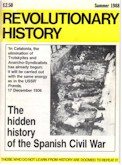
Revolutionary History
Andy Durgan: Marxism, war and revolution: Trotsky and the POUM (pdf) (Vol. 9, No. 2, 2006, p.27-65; online at Marxists Internet Archive).
“For Trotsky, however, the principal lesson of the Spanish revolution was the need for a revolutionary party. Not surprisingly therefore, much of what he wrote during and after the Civil War concerned the errors of those who considered themselves revolutionary Marxists.” In Swedish: Marxism, krig och revolution: Trotskij och POUM (pdf) (Marxistarkiv.se).
See the journal at Marxists Internet Archive, Encyclopedia of Trotskyism Online (ETOL): Back issues:
Special Issue: The Spanish Civil War: the view from the left (Vol. 4, No. 1-2, 1991-92, 402 p.) (Dedicated to the Memory of Sam Bornstein).
Contents: Introduction (p. 1-7).
Part 1: Causation
- The Spanish Trotskyists and the foundation of the POUM, by Andy Durgan (p. 11-53).
- Hans Schanfranek: Kurt Landau (p. 54-72).
- Kurt Landau: The Spanish Revolution of 1936 and the German Revolution of 1918–19 (p. 73-99).
- Spain betrayed: how the Popular Front opened the gates to Franco, by M. Bortenstein (M. Casanova) (p.100-221).
Part 2: Eyewitness
- Nicola di Bartolomeo: The Activity of the Bolshevik-Leninists in Spain and its Lessons (p. 225-241).
- Don Bateman: Georges Kopp and the POUM Militia (p. 242-252).
- Domenico Sedran: Carlini in Spain: An Italian Trotskyist in the Spanish Civil War (p. 253-264).
- Pietro Fancelli: Letters from Spain [1936] (p. 265-267).
- August Thalheimer: Notes on a Stay in Catalonia [November-December 1936] (p. 268-283).
- A Brandlerite Militant: Three Months on the Huesca Front (April-June 1937) (p. 284-302).
- Sherry Mangan: Spanish Militants Describe Their Escape from Barcelona (p. 303-313).
Part 3: Analysis
- Hans David Freund: Letters from Madrid (p. 317-323).
- Hans David Freund: Dual Power in the Spanish Revolution (p. 324-328).
- Jose Rebull: On Dual Power (p. 329-332).
- Jose Rebull: On the Slogan of a UGT-CNT Government (p. 333-335).
- Waldemar Bolze: Where are the Real Saboteurs? (p. 336-344).
- J. Rous: Spain 1936-39: the murdered revolution (p.345-402).
Theme: The hidden history of the Spanish Civil War (Vol. 1, No. 2, Summer 1988, 55 p.).
- Editorial
- Paul Flewers: Stalinism & Spain (with Spartacist statement) (p. 5-7).
- Pierre Broué: Walter Held (p. 7-9).
- Nils Kaare Dahl: Some memories of Walter Held (p. 9-11).
- Walter Held: Stalinism and the POUM in the Spanish Revolution (p. 11-17).
- Keith Hassell: Trotsky and the POUM (p. 18-19).
- Pierre Broué: The ”˜May Days’ of 1937 in Barcelona (p. 19-21).
- Hugo Oehler: Barricades in Barcelona, with preface by Ernest Rogers (p. 22-29).
- The Spanish Left in its own words [documents, manifestos etc.] (p. 30-39).
- Katia Landau: Stalinism in Spain (p.40-55).
See also:
Document Library: Spanish Revolution / Spanish Trotskyism (Marxists Internet Archive).
RS21: Revolutionary Socialism in the 21st Century
1936: revolution in Spain (July 18, 2016).
“Andy Durgan argues in an articles marking the anniversary of General Franco’s military coup against the Republican government of Spain, that the revolution was always up for grabs.”
Science & Society
Special issue: The Spanish Civil War: ideologies, experiences, historical recovery (Vol. 68, No. 3, Fall 2004). Only contents online.
Editorial perspectives: Spain, the legacy, the challenge.
“This special issue is less than a systematic history, but it is also much more: it reveals the rich interface between politics and psychology, between history and biography, on both sides of the war; it studies the ambiguities, contradictions and insufficiencies as well as the inspirational aspects of the Spanish Civil War; above all, it brings out some of the intensity of this early confrontation with fascism …”
Socialism Today
Tony Saunois: 1936: Spain’s revolutionary promise (Issue 200, July-August 2916).
“Eighty years ago, the working class and poor peasants of Spain rose up against capitalist exploitation, dire poverty and fascist forces – a high point of years of struggle. At times, they held power in their hands.”
The SWP & the Spanish civil war (Issue 103, September 2006).
“A recent commemorative article in Socialist Worker (Fighting the fascists, creating a new world in Spain) on the Spanish civil war says a lot about the rightward political evolution of the SWP, argues Bob Labi.”
Revolution and civil war (Issue 102, July-August 2006).
“This month sees the seventieth anniversary of the start of the Spanish civil war, preceded by the election victory of the Popular Front in February 1936. Per-Åke Westerlund, of Rättvisepartiet Socialisterna (CWI Sweden), recounts the tumultuous events and draws out the lessons of Spain.”
Socialist Appeal
80 Years since the Spanish Civil War (July 18, 2016).
On 17-18 July, 1936, General Franco began his military uprising in Morocco, a prelude to the fascist uprising throughout Spain. The workers responded in a spontaneous fashion. Rob Sewell and Alan Woods discuss the revolutionary events of the 1936 Spanish Civil War.”
Socialist Review
Andy Brown: Spain in Our Hearts (Issue 416, September 2016; online at Internet Archive). Review of Adam Hochschild: Spain in Our Hearts: Americans in the Spanish Civil War, 1936-1939 (Macmillan, 2016, 464 p.)
“Hochschild’s study of Americans in the war is definitely at the better end of the literature.” See also Emanuele Saccarelli: Adam Hochschild’s Spain in Our Hearts: A deeply felt work on the Spanish Civil War marred by its perspective (World Socialist Web Site, 3 October 2016)
Peter Robinson: Spain 1936: from war to revolution (Issue 415, July-August 2016; online at Internet Archive).
“On 17 July 1936 a cabal of army officers staged a military coup against the Spanish government. Workers had to decide how to respond. It was a pivotal moment for the politics of the 1930s and there are important lessons for socialists today.”
Judy Cox: The red brigades (Issue 190, October 1995; online at Internet Archive).
“The new Ken Loach film Land and Freedom tells the story of a young man who joins the International Brigades to fight fascism in Spain in 1936. Judy Cox looks at their heroic struggle, and the workers’ revolt which shook the ruling classes throughout Europe.”
Socialist Worker
Fighting fascism—remembering the International Brigades. By Simon Basketter (Issue 2727, 18 October 2020). Review of Giles Tremlett, The International Brigades: Fascism, Freedom and the Spanish Civil War (Bloomsbury, 2020, 720 p.).
“A new book tells the remarkable stories of the International Brigades who fought fascism in Spain. It’s a fascinating part of the Civil War.” See also review by Chris Bambery (Counterfire, November 12, 2020) + Andy Durgan: The International Brigades (Irish Marxist Review, Vol.10, No.29, 2021, p.95-97).
See also Giles Tremlett: The International Brigades in the Spanish Civil War (1936) (Travels Through Times), with link to podcast interview: 1936: The International Brigades (YouTube, 2 November 2020, 46 min.).
Revolution and war in Spain in 1936 – a battle that could have been won (Issue 2512, 12 July 2016).
“This month marks 80 years since fascist General Franco’s coup in Spain sparked resistance that quickly turned to revolt. Socialist Worker looks at how it could have won.”
- Series by Mathew Cookson:
Franco’s victory was not inevitable (Issue 2264, 13 August 2011).
“In this final column … how Spain’s revolution could have won …” - How Spain’s flames of hope were extinguished] (Issue 1263, 6 August 2011).
“… how a counter-revolution won control.” - Revolutionary days in Spain (Issue 2262, 30 July 2011).
“… a coup attempt in Spain sparked a revolution,.. the failures of socialists outside the Communist Party and anarchists allowed …”
Andy Durgan: Andreu Nin and the Poum in the Spanish Revolution (Issue 2057, 26 June 2007).
“The revolutionary socialist Andreu Nin resisted fascism and Stalinism during the Spanish Civil War of 1936-9. Nin was murdered by Stalinists 70 years ago this month.”
Theme: Barcelona May 1937:
Andy Durgan: The move to crush possibility of change in Spain (Issue 2051, May 19) + How the counter revolution began in Spain (Issue 2052, May 26) + Repression that crushed the Spanish revolution (Issue 2053, June 2, 2007).
Theme: The Spanish Revolution 1936 to 1939 (Issue 2010, July 22, 2006).
“On the 70th anniversary of the Spanish Revolution, Andy Durgan looks at the events, Angeles Rodenas interviews British veterans and Michael Eaude talks about the history and culture of Barcelona.”
Contents:
Fighting the fascists, creating a new world in Spain – Spanish civil war veteran: Sam Lesser, Penny Feiwel, Jack Jones, Alun Menai Williams, Jack Cummins and Tommy Nicholson – Timeline of the Spanish Revolution – Barcelona: the culture of revolt.
SocialistWorker.org
Revolution in 1930s Spain (July 21, 2011).
“In the first part of a two-part article, Geoff Bailey explains the years of rebellion and reaction that led to the Spanish Civil War.”
The Spanish Civil War (August 18, 2011).
“In the second part of a two-part article, Geoff Bailey tells the story of the battle between the working-class revolution and the fascist generals over Spain’s future.”
Solidarity
Liam McNulty: Trotskyism and the Spanish workers’ movement (Issue 242, 18 April 2012).
“The debates of Trotsky and others centred on the different political tendencies in the Spanish workers’ movement: the anarchists, the reformist socialists and the communists.”
The tragedy of Spanish Trotskyism (Issue 243, 25 April 2012).
“Liam McNulty concludes his article on the Trotskyists in the Spanish revolution of 1936/7.”
Trotskyist International
Keith Harvey: Trotskyists and the POUM (Issue 18, October-December. 1995, p.34-36).
“Keith Harvey explains the politics of the POUM. Their opposition to Stalinism made them the first victims as Stalinism beheaded the Spanish Revolution.”
What Next?: Marxist Discussion Journal
Jim Creegan: What happened in the Spanish Civil War? (Issue 31, August 2006).
“On 19 july Counterpunch launched an occasional series commemorating the 70th anniversary of the beginning of the Spanish Civil War … It is disappointing that Navarro himself only goes part of the way in dispelling the misconceptions that continue to surround the war … Missing from his overview, as it was from official Spanish Republican propaganda of the time, are the class struggles that took place behind Republican lines.”
Pierre Broué: Trotsky and the Spanish Revolution (1967).
“This article was written as an introduction to a Spanish language edition of Trotsky’s writings on the Spanish Revolution. The English translation that appears here was published in Fourth International (Vol. 4, No. 1, April 1967).”
Louis Araquistain: The Communists and the Spanish Civil War (1939).
“This article was originally published in three parts in the New York Times (19, 21 May and 4 June 1939), shortly after the Spanish Republic’s final defeat at the hands of Franco’s forces. The author was the Republic’s ambassador to France in 1936-7.”
Andrés Nin: The political situation and the tasks of the proletariat (1937).
“Nin’s critique of the popular front strategy in Spain, and the Communist Party’s role in it, was intended to provide the basis for a discussion on political strategy at the POUM national conference in June 1937, but the party was outlawed before it could take place.”
Andrés Nin: The May Days in Barcelona (1937).
A Danish Trotskyist in the Spanish Civil War. (pdf) (No. 29, 2004).
Interview with Åge Kjelsø [1914-1995] by Carl Heinrich Petersen, 1976, on his experiences in the International Brigades, “first published in 1977 in No. 17 of the Danish magazine Hug! The translation is by Mike Jones. ” “.. in Yugoslavia together with a Danish comrade and co-thinker .. [decided] to go to Spain to participate in the first serious resistance struggle against fascism raging there. Therefore, I set course from Yugoslavia to Spain, and after a long and exhausting journey by cycle] …”
Workers Liberty
Theme: The betrayal of the Spanish revolution (3/6, September 2006):
Sean Matgamna: Revolution and betrayal
“Two forces on the Republican side destroyed this Spanish workers’ revolution and thus prepared the way for the victory of fascism – anarchism and Stalinism.”
Miriam Gould: A study in workers’ power (1943).
“In many respects there were very close parallels between the proletarian revolutions of [Russia] 1917 and [Spain] 1936. Spain and Russia were both gripped by profound economic crises rooted in their semi-feudal land systems. Both were agricultural economies based on a poverty-stricken peasantry.”
Leon Trotsky: “Diary” of the Spanish Revolution and Civil War – 1936-9
“Though Leon Trotsky’s writings on Spain fill a large volume, he wrote no concise overview of the Spanish revolution. Our ‘diary’ is culled from the commentaries he produced all through the last decade of his life: the last item here is dated 20 August 1940, the day Trotsky was assassinated.”
World Socialist Web Site
Spanish socialists, communists enter bourgeois government (75 years ago, This week in history: August 29-September 4, 2011).
“4th of September 1936 the mass organizations of the Spanish working class definitively took the road of class collaboration …”
Adam Hochschild’s Spain in Our Hearts: A deeply felt work on the Spanish Civil War marred by its perspective. By Emanuele Saccarelli (3 October 2016). Review of Adam Hochschild: Spain in Our Hearts: Americans in the Spanish Civil War, 1936-1939 (Macmillan, 2016, 464 p.)
“To conclude, while Hochschild’s Spain in Our Hearts contains some valuable information and a moving account of important individual experiences, on the whole the book is part of a long tradition of miseducation concerning a political experience that casts a long shadow over the 20th century, down to today.”
British Trotskyists challenge falsification of Spanish Civil War history. By our reporter, 21 April 2009.
“… an evening discussion entitled “Civil War and Foreign Intervention in Spain” on April 2. Professor Preston was chairing a panel made up of Professor Angel Viñas of the Universidad Complutense de Madrid and Professor Helen Graham of Royal Holloway College, London. The meeting was to commemorate the end of the Spanish Civil War on March 31, 1939.”
Ann Talbot: The Spanish Civil War and the Popular Front, Part 1-2 (26 + 27 January 2009).
“Spain is the most complete expression of the Popular Front policy that was initiated by Stalin after Hitler came to power in Germany in 1933 … It meant that Communist Parties renounced the objective of proletarian revolution and instead engaged in cross-class collaboration with liberal, republican or social democratic parties in … the defence of their own nation-states.”
Ann Talbot: Recycling Stalinist lies about the Spanish Civil War (October 6, 2007).
Book review of El Escudo de la Republica by Angel Viñas (Barcelona, 2007).
Ann Talbot: Eric Hobsbawm on the Spanish Civil War: an anti-historical tirade (March 16, 2007).
“Eric Hobsbawm recently wrote an article in the Guardian about the Spanish Civil War, partly in memory of the 60th anniversary of that war, and partly to trail his forthcoming book Globalisation, Democracy and Terrorism.” See also Eric Hobsbawm’s article: War of ideas (The Guardian, February 17, 2007).
Bill Van Auken: Congress held in Madrid on 70th anniversary of Spanish Civil War (December 4, 2006).
“While a number of the papers submitted to the congress included valuable studies of the civil war’s impact in different regions and social spheres, others reflected the post-modernist tendency in academia internationally to seek ethnic, gender-based, and psychological explanations for historical events.” See also Introductory remarks by World Socialist Web Site correspondent at Madrid congress on Spanish Civil War.
Paul Mitchell and Vicky Short: Right wing attempts to rehabilate Franco : Seventy years since the Spanish Civil War, Part 1-3 (13 + 14 + 16 March 2006).
“While the revisionist historians are unable to ignore the atrocities, they seek to justify them instead. One such historian, a favourite of the right-wing Popular Party (PP), is the former Maoist Pio Moa. In his latest book, Franco – a Historical Balance, Moa tries to justify the repressive measures carried out by the dictatorship.”
A World to Win
The battle for Spain (2006).
“Corinna Lotz reviews The Battle for Spain, Antony Beevor’s book on the Spanish Civil War, and says that the Republic’s heroic struggle holds many lessons for today when democratic rights are under attack: Beevor is one of the most gripping chroniclers of epic military confrontations which changed the course of the 20th century … But in political analysis Beevor tends toward a non-dynamic and simplistic view of the underlying forces which shape history. He tends to detach the political and the military from the living conflict of social forces.”
ZNet
Tom Wetzel: Looking back after 70 years … (August 3, 2006).
“For the first time in Spanish history, the people aggressively resisted an army takeover attempt. The coup was defeated in two-thirds of the country. The unions moved to confiscate vast amounts of capitalist assets, putting most of Spain’s economy under worker management … The civil war itself was class struggle in its most extreme form.”
Websites
The Abraham Lincoln Brigade Archives (ALBA)
“Promotes international discussion on topics relating to the Spanish Civil War, the experience of the International Brigades, and the antifascist struggles of the 1920s and 1930s … Sponsored by the Veterans of the Abraham Lincoln Brigade (VALB) and the Abraham Lincoln Brigade Archives (ALBA)”.
Anarchy Archives
History (articles & sites) – Bibliography (printed & online pamphlets) – Buenaventura Durruti – Graphics (large photo collectons)
The International Brigade Memorial Trust (IBMT)
“Events – Newsletter – Memorials – Merchandise – Links – Education.
” [The site] was formed in 2002 … To educate the public in the history of the men and women who fought … in the Spanish Civil War. In particular, by preserving and cataloguing valuable historical material relating hereto and by making such material available to the public”.
International Institute of Social History (IISH)
WWW Virtual Library Labour History: Special Topics:
Spanish Civil War Collection Guide
Mostly Spanish Civil War links, in English, Spanish & German.
Libcom.org
Spanish civil war.
“Articles about the Spanish Civil War and social revolution from 1936-1939 which was sparked by a military rising lead by right-wing General Franco.”
Marxists Internet Archive
History of the Spanish Revolution, 1934-1939.
Writers, Documents, Organizations and Posters.
The Trotsky Encyclopedia: Spanish Revolution / Spanish Trotskyism (from Revolutionary History, 1988-1992).
Leon Trotsky: Collected writings on the Spanish Revolution 1931-1937. An Index to his Writings.
Andrés Nin Internet Archive, 1892-1937.
Biography and Works.
Modern American Poetry: An Online Journal and Multimedia
Companion to Anthology of Modern American Poetry
Articles, poems, essays, etc. by American and English poets.
Incl.: A Spanish Civil War photo Essay + Spanish (Spanish) Civil War Posters.
Spartacus Educational
Spanish Civil War.
Main Events and Issues: Political Organizations – Military Organizations – Important Battles and Strategic Positions – Biographies: Spanish – Biographies: Foreign – Participants & Observers – International Leaders and the Civil War – Individual Countries and the Spanish Civil War.
Spanish Civil War (Overview).
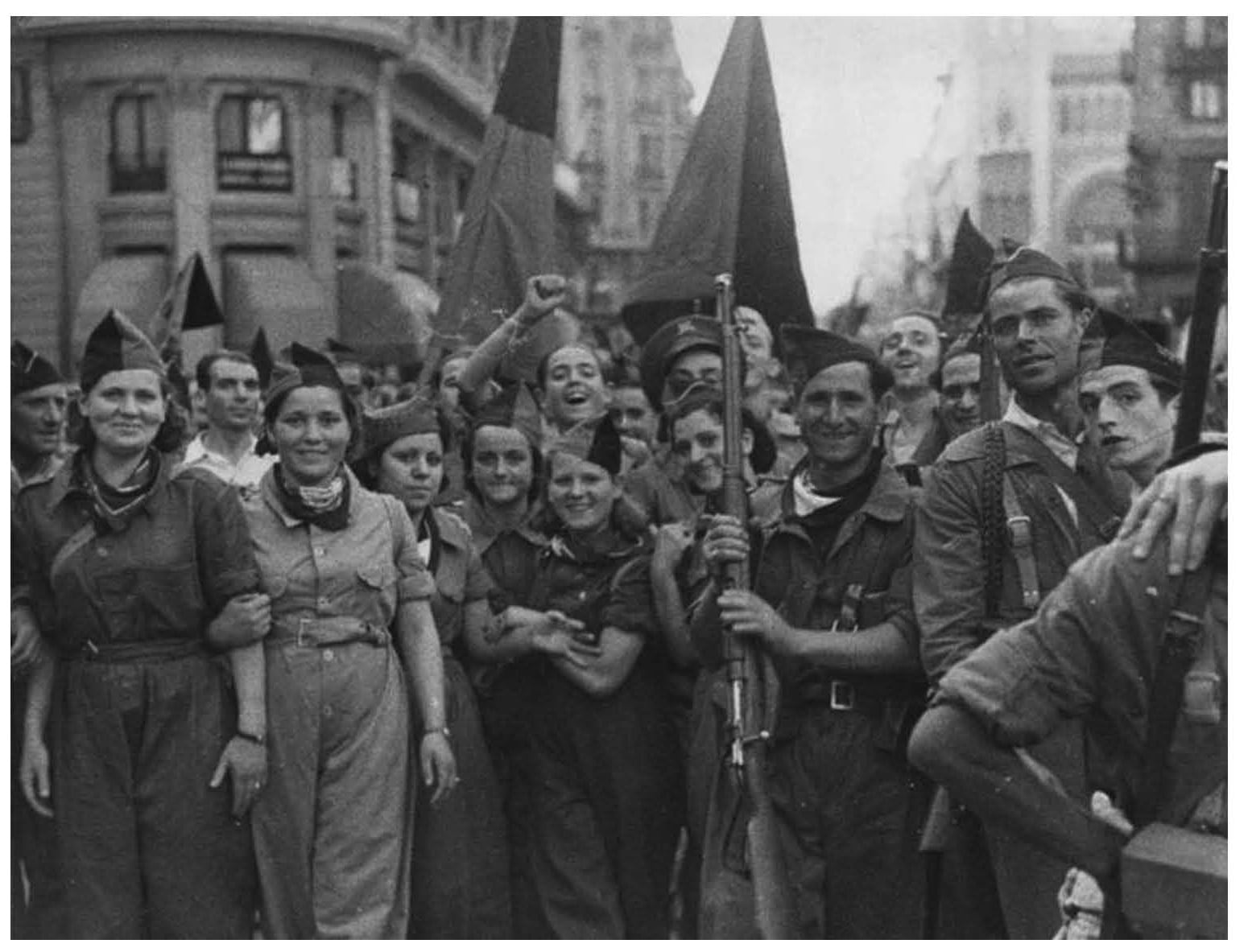
Books, pamphlets & chapters of books online
(In chronological order)
Katalonien i krig och revolution, 1936-1939
Av Pelai Pagès (Marxistarkiv.se, november 2021, 130 s., pdf)
“Översättningen av denna bok har huvudsakligen utgått från engelska utgåvan, War and Revolution in Catalonia, 1936-1939, (2014), men även den spanska, Cataluña en guerra y en revolución 1936-1939 (2007), har använts.
Denna viktiga bok som ger nya perspektiv på revolutionen och inbördeskriget i Spanien är nu komplett.”
Barricades in Barcelona: The CNT from the victory of July 1936 to the necessary defeat of May 1937
By Augustin Guillamón (Rosario, Argentina, 2013, 196 p.; online at Libcom.org)
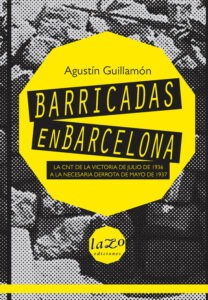
The Friends of Durruti Group: 1937-39
By Agustin Guillamon (1996; online at Spunk Library).
“Agustin Guillamón’s monograph on the Friends of Durruti Group affords readers of English the most comprehensive and thorough exploration and account of the history and ideas of that group.”
See also Part 3 in the book above: The death and funeral of Durruti + Interview with Buenaventura Durruti, by Pierre Van Paasen (Toronto Daily Star, Madrid, 1936; online at Spunk Library).
To Remember Spain: The Anarchist and Syndicalist Revolution of 1936
By Murray Bookchin (1994; online at Spunk Library).
“These essays are less an analysis of the Spanish Revolution and Civil War of 1936-39 than an evocation of the greatest proletarian and peasant revolution to occur over the past two centuries.”
Trotsky. Vol. 4: The darker the night the brighter the star – 1927-1940
By Tony Cliff (1993; online at Marxists Internet Archive).
Chapter 11: Trotsky and the Spanish Revolution (page 235-290)
“Trotsky was absolutely convinced that the victory over fascism in the Spanish Civil War depended much less on military technique than on the politics followed by the anti-fascists.”
The Spanish Civil War: Anarchism in Action
By Eddie Conlon (1986/1993; online at The Struggle Site).
“An introduction to the role of anarchism in the Spanish Civil War / Revolution of 1936”. For a translation in Norwegian from 2009 (50 p.), see Motmakt.no (pdf).
The Spanish Civil War in Euzkadi and Catalonia 1936-39
By Miguel Romero (1991; online at IIRE – The International Institute for Research and Education).
“Miguel Romero questions conventional history and tries to look at it from the point of view of the defeated and oppressed. This starting point makes it possible for him to show that the defeat of the revolutionaries in the republican camp (particularly in Catalonia in spring 1937) paved the way for Franco’s victory.”
The Comintern
By Duncan Hallas (1985; online at Marxists Internet Archive).
Chapter 7: The Terror and the People’s Front: The Spanish Revolution.
“Stalinism … destroyed the Spanish revolution.”
Collectives in the Spanish Revolution
By Gaston Leval (1975; online at Libcom.org).
“Detailed account of worker-controlled agriculture, industry and public services in revolutionary Spain during the civil war.
The Anarchist Collectives: Workers’ Self-Management in the Spanish Revolution, 1936–1939
Ed. Sam Dolgoff (1974; online at The Anarchist Library)
“My purpose in this collection is to provide an introduction to this unique experience [in workers’ self-management].”
The Spanish Revolution
By Pierre Broué (online at Libcom.org, 1973, 66 p.).
“… our topic, the revolution, that is, the struggle of the Spanish workers and peasants for their rights and liberties, for the factories and the land, and finally, for political power.”
American Power and the New Mandarins
By Noam Chomsky (1967; online at Digital Text International)
Chapter: Objectivity and Liberal Scholarship
“Noam Chomsky’s analysis of the Spanish Revolution and his critique of liberal interpretations of it.”
The extensive, detailed footnotes has not been uploaded. They can be found in the print version.
In Danish: Objektivitet og liberal videnskab (Gyldendal 1970, s. 76-128 + Notes, s. 129-165).
Anarchism: From Theory to Practice
By Daniel Guerin (French ed. 1965, English ed. 1976; online at Libcom.org).
Chapter 3c: Anarchism in the Spanish Revolution.
The Soviet mirage – The Anarchist tradition in Spain – Theory – An ‘apolitical’ revolution – Anarchists in government – Self-management in agriculture – Self-management in industry – Self-management undermined.
How the NKVD framed the POUM
By Jesús Hernández (1953; online at Marxists Internet Archive).
“This account of the POUM’s suppression in 1937 is taken from the memoirs of Jesús Hernández, published in 1953 in Mexico as Yo fuà un ministro de Stalin (I was a Minister of Stalin) and in a French version as La Grande Trahison (The Great Betrayal). At the time of the Civil War, Hernández was a leading figure in the Spanish Communist Party.” (Pamphlet, 2005).
Spain Betrayed: How the Popular Front Opened the Gates to Franco
By Mieczyslaw Bortenstein (1939; online at Marxists Internet Archive).
“This account was first published over the pseudonym of M Casanova as a pamphlet in the Le Tract collection (no 3) and in Quatrième Internationale, no 17, May 1939.”
See also Swedish edition at Marxistarkiv.se (pdf).
Revolution and Counterrevolution in Spain
By Felix Morrow (1938; online at Marxists Internet Archive).
“The text of the following book is that of the second edition of 1963 published by New Park Publications together with the introduction written at that date by the late Tom Kemp.”
See also the Swedish edition: Spanien 1931–1937: Revolution och kontrarevolution (pdf) + artikelsamlingen Om spanska inbördeskriget 1938-39 (pdf) (Marxistarkiv.se).
Review: Morrow on Spain. By Ernest Mandel (International, Vol.2, No.3, Summer 1974, p.40-42; online at Marxist Internet Archive).
Homage to Catalonia
By George Orwell (1938; online at George-Orwell.org).
“Orwell’s personal account of the Spanish Civil War, written in the first person. The first edition was published in 1938. Orwell was in Spain from December 1936 to June 1937.”
See also:
Spilling the Spanish Beans (1937; online at Gutenberg.net.au).
Looking Back on the Spanish War (1942; online at Gutenberg.net.au).
Homage to Catalonia: the working class in the saddle (RS21: Revolutionary Socialism in the 21st Century, July 15, 2016).
“Colin Revolting revisits George Orwell’s masterpiece of revolutionary reportage.”
Orwell and the Spanish Revolution, by John Newsinger (International Socialism, Issue 62, Spring 1994, p.71-90).
“George Orwell’s ‘Homage to Catalonia’ is quite simply one of the best books ever written about revolution. But it has always suffered attack from sections of the left-Stalinists then and some feminists today. John Newsinger looks at the history of the Spanish Revolution, Orwell’s politics and the reaction of his critics.”
Stalinism in Spain
By Katia Landau (1938; online at Marxists Internet Archive).
“This article first appeared as a pamphlet under the title Le Stalinisme en Espagne in Paris in 1938, and was republished in 1971 and 1986 as Le Stalinisme, Bourreua de la Revolution Espagnole, 1937-1938.” With preface by Alfred Rosmer.
The Tragedy of Spain
By Rudolf Rocker (1937; online at Libcom.org).
“July 19th was the anniversary of the day on which a gang of militarist adventurers rose against the republican regime in Spain and, with the assistance of outside powers and foreign troops, plunged the country into a bloody war.”
Review by Felix Morrow: Anarchism in Spain (New International, January 1938).
Bookwatch: Civil war and revolution in Spain. By Andy Durgan (International Socialism, Issue 69, Winter 1995, p.109-121).
“… a comprehensive readers’ guide to one of the turning points of the 20th century.”
Spanish civil war 1936-39: reading guide (Libcom.org).
“Libcom.org’s reading guide on the Spanish civil war and social revolution from 1936-1939 which, sparked by a military rising lead by right-wing General Franco, was arguably the most far-reaching revolution in history.”
On Marina Ginesta:
Marina Ginesta (Wikipedia.org)
Marina Ginesta, a 17-year-old communist militant, overlooking Barcelona during the Spanish Civil War, 1936 (Rare Historical Photos, December 1, 2013)
Marina Ginesta: Socialist activist whose photograph became one of the most memorable images of the Spanish Civil War. By Alasdair Fotheringham (Independent, January 22, 2014)
Films
Media Resources Center
The Spanish Revolution and Civil War
Wikipedia.org
- List of Spanish Civil War films
- List of war films and TV specials: Spanish Civil War (1936-1939)
- Category: Spanish Civil War films
See also at Socialistisk Bibliotek (Socialist Library):
Subject list: Ken Loachs film Land and Freedom
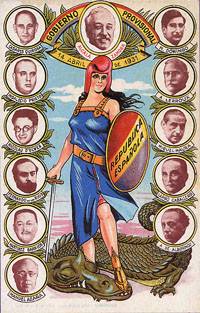
Posters/Photos
Flickr
Rediscovered Spanish Civil War negatives. “Lost since 1939, the Mexican Suitcase contains nearly 4,500 negatives documenting the Spanish Civil War by Robert Capa, Chim (David Seymour), and Gerda Taro.”
Se også:
The Mexican Suitcase (The Museum at International Center of Photography).
Den mexicanske kufferts spanske hemmeligheder. Af Kenn Schoop (SFAH, maj 2018). “Krigsfotografen Robert Capas forsvundne fotos fra Den spanske Borgerkrig udstilles i Malmø.” Vandreudstilling med Robert Capas, Gerda Taros og David Seymours fotos fra borgerkrigen:
- Fotografien gegen den Krieg. Von Hermann G. Abmayr (Kontext, 09.10.2013) + Photographers – Gerda Taro (Pinterest.dk)
- David Seymour’s Coverage of the Spanish Civil War (Magnum Pro).
Robert D. Farber University Achives and Special Collections Department
Spanish Civil War Posters
“A checklist, with links to images of selected posters … organized alphabetically by artist name.”
George Orwell (Orwell.ru)
- Spanish War in Slogans and Posters. By D. Murphy (2002). With 27 posters & flags.
Library of Congress: Prints & Photographs Online Catalog (PPOC)
App. 109 posters, searchable by Creator/Related Names & subjects.
Marxists Internet Archive
- Spanish Revolution Poster Collection (P.O.U.M. Posters).
Modern American Poetry: An Online Journal and Multimedia
The Visual Front
Posters of the Spanish Civil War from USCD’s Southworth Collection (of app. 100 posters).
See also at Socialistisk Bibliotek (Socialist Library):
Subject list: On Capas photograph “Falling Soldier”
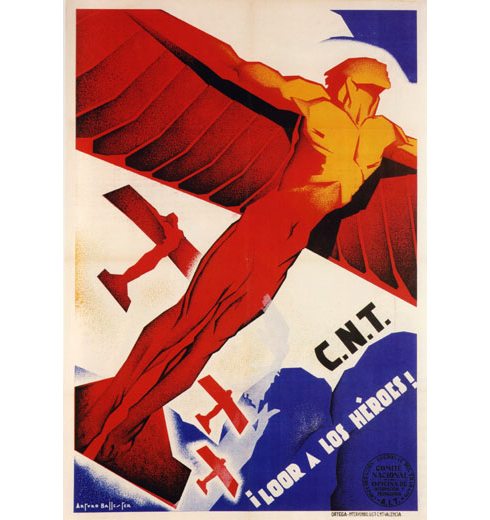
Songs
Remember the war against franco?
That’s the kind where each of us belongs.
Though he may have won all the battles,
We had all the good songs.
Tom Lehrer: The Folk Song Army (YouTube.com, with lyrics, 2:15 m.).
Category: Songs of the Spanish Civil War (Wikipedia.org)
Links to articles on app 15 of the most famous songs, with sources and links. Incl. some fascist songs.
Ernst Busch: Six Songs For Democracy (YouTube.com)
In German (most with texts beneath):
- Los Cuatros Generales/Vier Noble Generale (YouTube.Com, 2:14 m.)
Spaniens Himmel
- Spaniens Himmel (Wikipedia.de). In German.
- Ernst Busch: Spaniens Himmel (YouTube.com)
- Commandantes: Spaniens Himmel (YouTube.com)
Pete Seeger and the Almanac Singers: Canciones de las Brigades Internationales (YouTube.com)
- Quartermasters Song
- Viva La Quince Brigada
- Pete Seeger in Barcelona – Viva la Quince Brigada (1993)
- More on Peter (Pete) Seeger and The Almanac Singers.
Jarama Valley – Arlo Guthrie and Pete Seeger. (YouTube.com, 2:47 m.)
From the album: Spain in My Heart – Songs of the Spanish Civil War (see below).
Spain in My Heart – Songs of the Spanish Civil War (YouTube.com)
Playlist (17 videos)
On the International Brigades
A repeat of some of the materials above on this subject !On George Orwell and the Spanish Civil War, see above.
On Ken Lochs film ‘Land and Freedom’ (1995), see above.
Canciones De Las Brigadas Internacionales by various artists
Pete Seeger (From the playlist, Artist Direct).
Brigadistes: Lives for Liberty (Counterfire, Chris Bambery welcomes Brigadistes, a wonderful collection of portraits of international volunteers for the Republican side of the Spanish Civil War.”
Fighting fascism—remembering the International Brigades. By Simon Basketter (Socialist Worker, Issue 2727, 18 October 2020). Review of Giles Tremlett, The International Brigades: Fascism, Freedom and the Spanish Civil War (Bloomsbury, 2020, 720 p.).
“A new book tells the remarkable stories of the International Brigades who fought fascism in Spain. It’s a fascinating part of the Civil War.” See also review by Chris Bambery (Counterfire, November 12, 2020) + Andy Durgan: The International Brigades (Irish Marxist Review, Vol.10, No.29, 2021, p.95-97).
See interview with Giles Tremlett: A global history of the International Brigades (International Brigade, Memorial Trust, 9 November 2020) + Giles Tremlett: The International Brigades in the Spanish Civil War (1936) (Travels Through Times), with link to podcast interview: 1936: The International Brigades (YouTube, 2 November 2020, 46 min.).
Theme: The Spanish Revolution 1936 to 1939 (Socialist Worker, Issue 2010, July 22, 2006).
“On the 70th anniversary of the Spanish Revolution, Andy Durgan looks at the events, Angeles Rodenas interviews British veterans and Michael Eaude talks about the history and culture of Barcelona.”
Contents:
Fighting the fascists, creating a new world in Spain – Spanish civil war veteran: Sam Lesser, Penny Feiwel, Jack Jones, Alun Menai Williams, Jack Cummins and Tommy Nicholson – Timeline of the Spanish Revolution – Barcelona: the culture of revolt.
Andy Durgan: Freedom fighters or Comintern army?: the International Brigades in Spain (International Scialism, Issue 84, Autumn 1999, p.109-131).
“The International Brigades are one of the most famous examples of internationalism in working class history. Andy Durgan, historical adviser on Ken Loach’s Land and Freedom, assesses their impact in the Spanish Civil War.”
John Newsinger: Orwell and the Spanish Revolution (Interntional Socialism, Issue 62, Spring 1994, p.71-90).
“[Orwell] is the author of one of the most important celebrations of revolution in English literature, Homage to Catalonia. In this account of his experiences with the POUM (United Marxist Workers Party) militia in Spain, he makes clear his commitment to both working class struggle and to socialism, and at the same time his steadfast opposition to Stalinism and its apologists.”
Websites
Asociación de Amigos de las Brigadas Internacionales, AABI (Madrid)
Spansksproget site om de internationale brigader (for ikke spansk-kyndige, klik i venstre spalte for “Select Language”)
The Abraham Lincoln Brigade Archives (ALBA)
“Promotes international discussion on topics relating to the Spanish Civil War, the experience of the International Brigades, and the antifascist struggles of the 1920s and 1930s … Sponsored by the Veterans of the Abraham Lincoln Brigade (VALB) and the Abraham Lincoln Brigade Archives (ALBA)”.

















